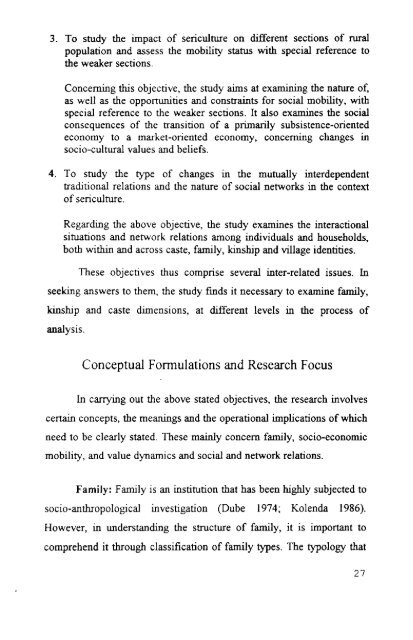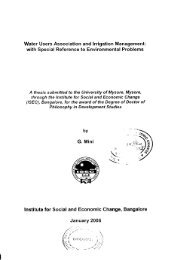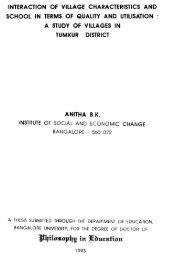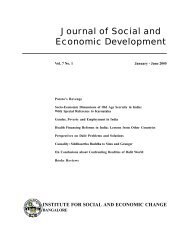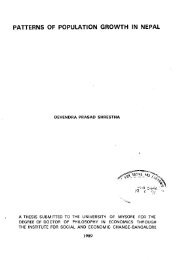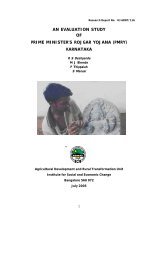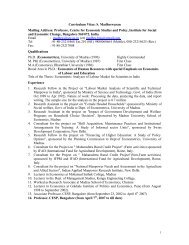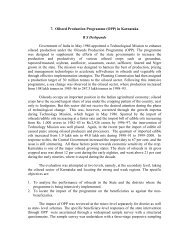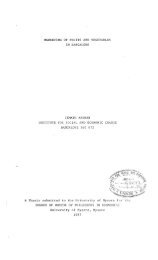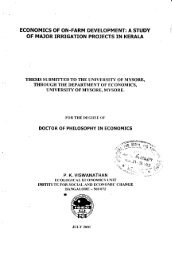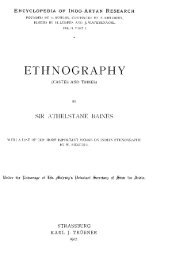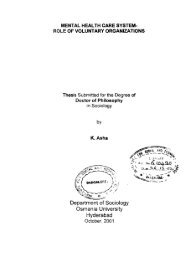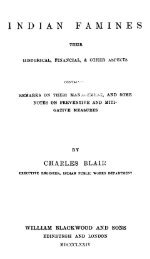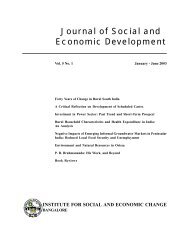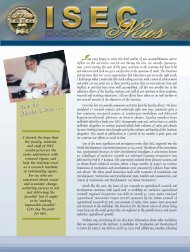- Page 1 and 2: SERICUL TURE AND THE PROCESS OF CHA
- Page 3 and 4: DECLARATION I hereby declare that t
- Page 5 and 6: would also like to thank my friend
- Page 7 and 8: LIST OF TABLES Table No. Title Page
- Page 9 and 10: CHAPTER I INTRODUCTION Socio-cultur
- Page 11 and 12: new International economic order. I
- Page 13 and 14: to the rural society, in particular
- Page 15 and 16: instance, is reported to have been
- Page 17 and 18: Industrialisation and greater emplo
- Page 19 and 20: means of economic survival (1970:12
- Page 21 and 22: to a region of small geographical a
- Page 23 and 24: people's attitudes towards Communit
- Page 25 and 26: dislocations. In his opmlOn, the pr
- Page 27 and 28: year has made it a hot favourite of
- Page 29 and 30: to social significance of sericub.I
- Page 31 and 32: to the adoption of sericulture may
- Page 33: As discussed earlier, any new techn
- Page 37 and 38: framework as 'matro family'. If it
- Page 39 and 40: The relation could be called a symm
- Page 41 and 42: enough to accept change and respons
- Page 43 and 44: upon the institutions. The study on
- Page 45 and 46: and presenting the significance and
- Page 47 and 48: CHAPTER II THE FIELD AND THE PEOPLE
- Page 49 and 50: TAMIL NADlJ Map No_ 2_2 ~ .... , i
- Page 51 and 52: Sericulture. The present study vill
- Page 53 and 54: Table No. 2.1: Per cent Dis(ributio
- Page 55 and 56: Table No. 2.2: Distribution of Hous
- Page 57 and 58: Table No. 2.3: Per cent Distributio
- Page 59 and 60: Literacy and Education: Table 2.4 p
- Page 61 and 62: 'convent school' in the village its
- Page 63 and 64: pollution, the sefYlce of the women
- Page 65 and 66: Appendix II provides some of the so
- Page 67 and 68: two and three, where there is a gre
- Page 69 and 70: hesitation. As far as girls are con
- Page 71 and 72: CHAPTERm LAND AND ECONO~IIC DIVERSI
- Page 73 and 74: Agriculture lands work out to be ne
- Page 75 and 76: Cotton was the predominant crop in
- Page 77 and 78: These are mainly rain-fed lands and
- Page 79 and 80: Table No. 3.1: Activity Profile and
- Page 81 and 82: one as it lacks any visible product
- Page 83 and 84: production along with meeting any o
- Page 85 and 86:
Table No. 3.2: Sources of Household
- Page 87 and 88:
economies of the village, it is any
- Page 89 and 90:
considerations are developed within
- Page 91 and 92:
diseases. Some people prefer chawki
- Page 93 and 94:
with other related agencies and fel
- Page 95 and 96:
m the village. The fourth phase, co
- Page 97 and 98:
communities except the Vanniars. Wh
- Page 99 and 100:
the large farmers, sericulture may
- Page 101 and 102:
Table No. 4.4: Activity PronIe of S
- Page 103 and 104:
Table No. 4.5: Intensity ofSericult
- Page 105 and 106:
indication in the activity profile
- Page 107 and 108:
Table No. 4.61 Land Size, Scale and
- Page 109 and 110:
productivity at the different perfo
- Page 111 and 112:
indicates that the hired male labou
- Page 113 and 114:
variation is striking. However, the
- Page 115 and 116:
sections from taking up sericulture
- Page 117 and 118:
here concern the supply of material
- Page 119 and 120:
Other inputs like disinfectants and
- Page 121 and 122:
Adoption of Technology The deparnne
- Page 123 and 124:
sericulturists, however, accept suc
- Page 125 and 126:
oom with bleaching powder. Some go
- Page 127 and 128:
sericultwists invariably turn out t
- Page 129 and 130:
the eye. Some say that continuous i
- Page 131 and 132:
Labour is generally categorised as
- Page 133 and 134:
1986: ~~). Only the males are invol
- Page 135 and 136:
also engaged in out-put based tasks
- Page 137 and 138:
caste as well as class lines. In as
- Page 139 and 140:
Migration and Labour Scarcity: Seri
- Page 141 and 142:
Table No. 5.1: Labour Absorption in
- Page 143 and 144:
contract system have created a situ
- Page 145 and 146:
specific strategies in adopting the
- Page 147 and 148:
Karunalcaran in one of the study vi
- Page 149 and 150:
predominantly consist of the landle
- Page 151 and 152:
The present chapter has brought out
- Page 153 and 154:
have the potentiality of disturbing
- Page 155 and 156:
However, many of these studies have
- Page 157 and 158:
Table No. 6.1: Distribution of Seri
- Page 159 and 160:
variation, in favour of sericulture
- Page 161 and 162:
Number of Adults and Relationship S
- Page 163 and 164:
children, to extend some assIstance
- Page 165 and 166:
While Table 6.3 refers to all seric
- Page 167 and 168:
over women and of the old over the
- Page 169 and 170:
assert one's freedom in the areas o
- Page 171 and 172:
tend to act with restraint. This is
- Page 173 and 174:
handle the domestic roles all alone
- Page 175 and 176:
make the participation of women in
- Page 177 and 178:
However, the involvement of women i
- Page 179 and 180:
nuclear families where recently mar
- Page 181 and 182:
Table No.6. 7: Labour Involvement a
- Page 183 and 184:
specific recognition, depending on
- Page 185 and 186:
incentives to sericulturists in the
- Page 187 and 188:
atmosphere. So, it would not be muc
- Page 189 and 190:
access to land, which in tum, depri
- Page 191 and 192:
CHAPTERVll SOCIO-ECONOMIC MOBILITY
- Page 193 and 194:
labour for agriculture operations.
- Page 195 and 196:
econorruc status IS manifested in t
- Page 197 and 198:
The person makes further attempts t
- Page 199 and 200:
Sunilarly, Kannappan in Seripura (C
- Page 201 and 202:
The case of Tba..'1g3vel of E N Par
- Page 203 and 204:
among the marginal and small catego
- Page 205 and 206:
As for the labour utilisation, seri
- Page 207 and 208:
SCs in the village. All the drop ou
- Page 209 and 210:
they still possess certain external
- Page 211 and 212:
Gender Relations'. It has to be rei
- Page 213 and 214:
The family of Mahendran in K K Pura
- Page 215 and 216:
probably to keep out of any social
- Page 217 and 218:
ecome a menace. With better protect
- Page 219 and 220:
maturity of the laying and the meth
- Page 221 and 222:
However, the adoption of sericultur
- Page 223 and 224:
Sericulture plays a positive role i
- Page 225 and 226:
tend to be younger in age. This str
- Page 227 and 228:
of labour, etc. These sometimes ext
- Page 229 and 230:
escue. She has been doing sericultu
- Page 231 and 232:
of the village population. There ar
- Page 233 and 234:
Strategies and Prospects. These onl
- Page 235 and 236:
at the non-institutional level for
- Page 237 and 238:
system oflending or through an info
- Page 239 and 240:
other villages. Though skilled pers
- Page 241 and 242:
symmetric relations are distinguish
- Page 243 and 244:
have taken a new dimension with the
- Page 245 and 246:
the present study. The study has be
- Page 247 and 248:
In Seripura, there had been a large
- Page 249 and 250:
and matro-nuclear families is well
- Page 251 and 252:
labour has found greater recognitio
- Page 253 and 254:
most of them have to face similar c
- Page 255 and 256:
Social and Network Relations: This
- Page 257 and 258:
of the village, within the context
- Page 259 and 260:
In the analysis of socio-economic m
- Page 261 and 262:
dimensions of the project, concerru
- Page 263 and 264:
sustainability of the enterprise it
- Page 265 and 266:
Cernea.' Michael M. 1985. Putting P
- Page 267 and 268:
Govindaraju, K. V., P. Pugazhendi a
- Page 269 and 270:
ISST 1982. An Assesment of Women's
- Page 271 and 272:
Morns, J. 1981. Managing Induced Ru
- Page 273 and 274:
Srinivas, M. :--I. House. 1935. Ind
- Page 275 and 276:
upee salary at that time. Having fa
- Page 277 and 278:
factory started running on a loss w
- Page 279 and 280:
giving up sericulture though he doe
- Page 281 and 282:
participates in the sericulture act
- Page 283 and 284:
Being the eldest and the only daugh
- Page 285 and 286:
Meena hardly attends to other house
- Page 287 and 288:
activities of leaf picking, feeding
- Page 289 and 290:
her work-load becomes heavier, thou
- Page 291 and 292:
the second consecutive year. has he
- Page 293 and 294:
heavily on her brother for sericult
- Page 295:
SOCIO-ECONOMIC PROFILE Land holding


